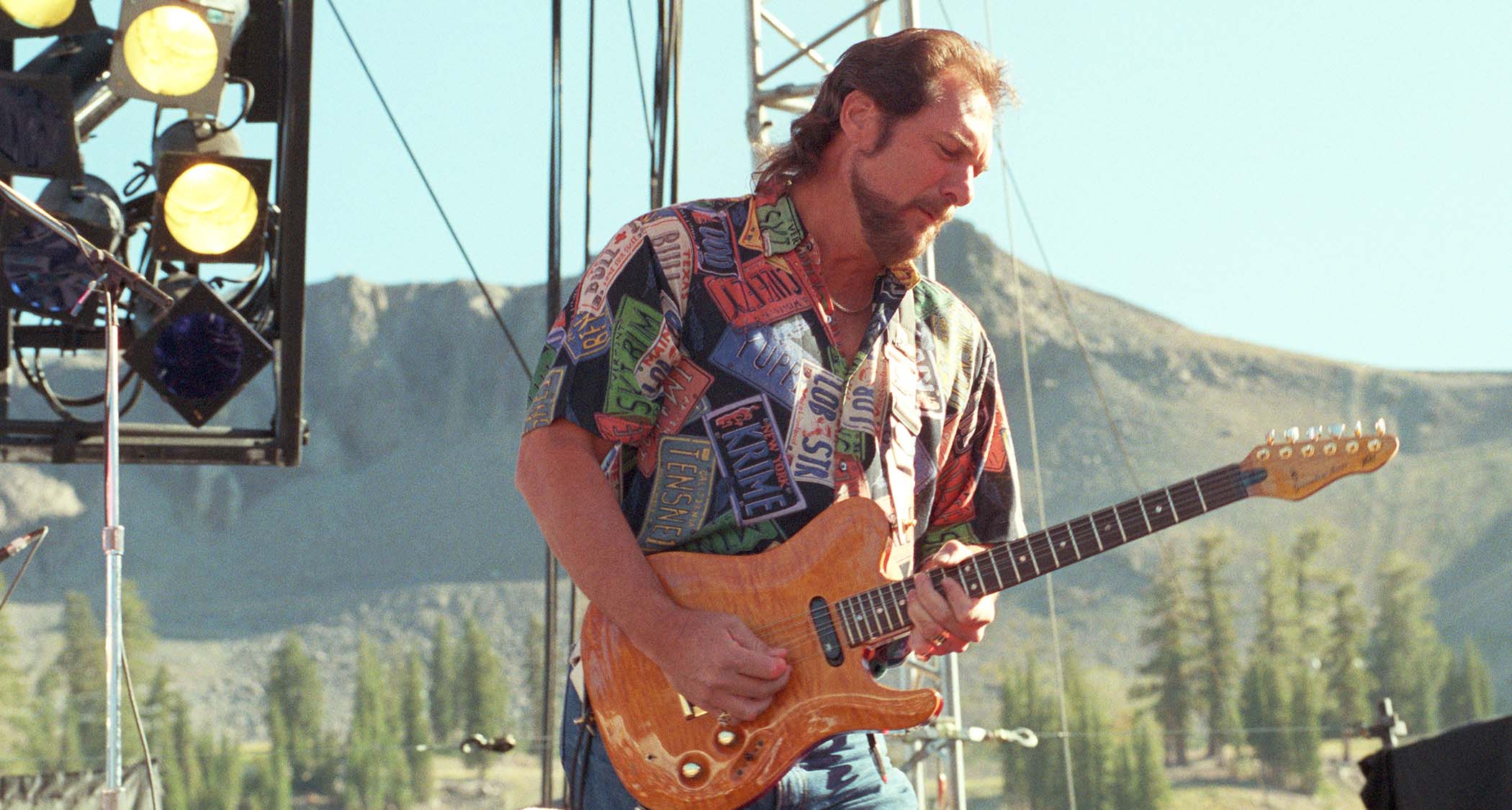“My playing has always sucked, but it sells, because I keep it simple, I guess. I’m not a guitar player, I never took the time”: Soul icon Steve Cropper on writing Green Onions, stressing out Brian May – and the secret of Billy Gibbons’ guitar style
Cropper says he isn't a great guitar player but if you co-wrote Green Onions and (Sittin’ On) The Dock Of The Bay, you don't need technical wizardry. He walks us through a career marked by hits, grooves and soul

As the guitarist in Booker T. & the M.G.’s, the house band for Stax Records, Steve Cropper was a key figure in shaping the sound of soul music in the ’60s, backing legendary singers including Otis Redding and Wilson Pickett.
Steve co-wrote the classic songs Green Onions and (Sittin’ On) The Dock Of The Bay, and also recorded with rock icons John Lennon and Rod Stewart. His latest album, Friendlytown, features guest spots from Billy Gibbons and Brian May.
How did Billy Gibbons come to be on the new album?
“Billy and I have been friends for 30 years, but we’ve never actually worked together before. He ran into Jon Tiven, my co-producer, in a grocery store and he asked, ‘What’s Steve doing these days?’ He told him we working doing an album and he said, ‘Good. Can I be on it? I’m not doing anything right now.’
“So he was there for two of the writing sessions. He played on all but one song, and we wrote Friendlytown, the title track, together. Most people put the title track of the album as the sixth or seventh song, but this one, I said, ‘It’s too damn good. We need to put it first!’”
How would you describe your guitar partnership with Billy?
“No song on this album is a battle of guitars or knowledge or wits – we’re both fans of one another. All these songs are under 3:30, they’re simple – two verses, two choruses and a bridge. Most songs nowadays are very long and poetic. Billy and I, we’re not bothered about poetry. We’re trying to show how it was back in the ’60s.
Get The Pick Newsletter
All the latest guitar news, interviews, lessons, reviews, deals and more, direct to your inbox!
Watching Billy’s hands in the studio, I learnt something I never knew – he plays two things at the same time. He always plays a bass part at the same time as his melody like Chet Atkins
“Watching Billy’s hands in the studio, I learnt something I never knew – he plays two things at the same time. He always plays a bass part at the same time as his melody like Chet Atkins would do, and like I do. You know, the first time I saw ZZ Top, I said, ‘How do three guys make that kind of music?’ And I found out in the studio with him!”
And what about Brian May?
“He’s known Jon Tiven for yeas, and we met at James Burton’s birthday about a year ago. Everybody was there. Brian and I got talking and we sent him a track, but then we hadn’t heard from him in a while. My engineer called him and Brian said, ‘Too much stress – everything’s coming at me a million miles an hour!’
“Four or five days later we got a copy of the track and it was pretty good! So we called the song Too Much Stress and wrote the lyrics around it. We didn’t have modulation in the song until Brian got his hands on it. He’s very talented. I’ve heard a lot of great guitar players and he’s one of the best in the world, I think.”

Going back to your early days, what guitar did you learn on?
“My first guitar is under glass now at the Memphis Music Hall of Fame. It’s only got three strings. I used to play it like a rubber band when I was eight years old. I bought it from the Sears Roebuck catalogue. It was a Country Western, a big round-hole, flat-top guitar.
“I’d sit on the porch waiting for that guitar to be delivered every weekend, waiting for the truck to turn the corner. And then it finally arrived. The strings were loose and the bridge needed fixing, and they wanted a 25 cent delivery fee – 25 cents! My mom said, ‘I’ll lend you that quarter if you become a guitar player’. She’s not around to defend herself anymore, but I think I did!”
What were some important lessons for you in developing your style?
“In the early days when I was playing guitar, I knew the world didn’t need another B.B. King, Chet Atkins or Les Paul. So, what are you gonna do now? I thought, ‘Just be yourself and do your thing. Don’t go changing’.”
Do you remember a moment you felt you were no longer a beginner guitarist?
“It would be doing Green Onions with Booker T. and the M.G.’s. Booker actually started writing that and then we worked on it together. A singer was meant to come into the studio but they never showed up – he’d been singing all night and he couldn’t even say his name in the morning so he never came in. So we were just jamming around waiting.
“A few weeks passed and we were working on the song Behave Yourself and the label said, ‘Do you have anything for the B-side?’ I said to Booker, ‘What were those riffs you had you thought would be good for a vocal song?’ We played it to them and they said ‘That’s pretty good’. And that was it. That was the record.”
What stands out to you in a guitarist?
Groove. If someone’s got groove, they’re gonna last a lot longer than the person who doesn’t, whatever groove means to you. To me it means soul. And play in the box, not outside it. That’s what people like. If you play too far outside the box people aren’t gonna like it.
I learned to play rhythm and lead at the same time so when I was soloing the rhythm wouldn’t drop out
“My playing has always sucked, but it sells, because I keep it simple, I guess. I’m not a guitar player, I never took the time. I use it as a tool. I couldn’t afford to hire another guitarist on a lot of Stax records, so I learned to play rhythm and lead at the same time so when I was soloing the rhythm wouldn’t drop out.
“Randy Bachman from The Guess Who taught me a lick, and it was more of a country lick where you could bend two strings at the same time, but he did it with two fingers. I figured out how to do it with one finger. I’ll never use a capo, either. God gave you a capo right here [hold up his first finger], so I learnt how to play a lot of chords with three fingers instead of four. That was important.

What was the last piece of gear you were excited about?
“The last guitar I bought was probably a Telecaster, but I’ve never been much of a collector, and I don’t play Teles anymore. I play Telecaster copies made by Peavey and I ran over the one I’ve got now. I ran over all the electrics; the tone and volume and the pickup switch. I hammered everything back into place and it all works fine.
“I plugged it in, looked and my engineer and said, ‘It still sounds good to me’, so it’s got something in it. I play it all the time. The problem with running it over is the pickup switch would keep rattling.
“I’d tighten it up and it would start rattling and changing position again. The bridge pickup is too damn bright for me. I’ve always preferred the middle position, so I took a bit of cardboard and stuffed in right in there so the switch can’t move!”
You’ve played with a lot of guitarists over the years, has anyone surprised you?
“Dave Mason [formerly of Traffic] really impressed me. I didn’t think he was that good until I toured with him, then I found out how good he really is. Live, he’s something else. Jeff Beck, too. Whatever Jeff’s mind thought, his hands would go there. You couldn’t say, ‘You can’t get that’ to Jeff. He’d just reach for things and grab it.
“He did things that no one else thought was possible and he’d make it sound right. Working on The Jeff Beck Group album [produced by Steve and released in 1972] is one of my proudest moments.”
Has anyone not impressed you?
“There was a guy who came into Stax one time that put a handkerchief over the strings so that no one could see what he was doing and copy him. I didn’t care about any of that. I’m sure he was a great player, but it didn’t impress me.”

What about any non-guitarists; who impressed you the most?
“A magazine once called me up and said, ‘I believe Stax Records is the first label to use an automatic drum?’ And I said, ‘Yeah, his name is Al Jackson!’ With Al on drums, you could edit the intro of take one with the intro of take ten and no one would know - he was that good of a timekeeper. He was great to play with.”
What advice would you give to a young guitarist?
“Do not get into this business for money. Do it for fun, and if you’re good, somewhere along the way someone will pay you.”
Can you recall a moment when you felt like you’d failed as a player, or been embarrassed by a performance?
“I don’t ever remember having a bad show. I’ve had records that went out to market and didn’t sell, so I guess I failed there, but the records themselves have been pretty clean and spot-on to me. I don’t release junk, not with my name on it. It has to be quality stuff. It might not sell, but I’m happy with it. I don’t have any regrets.”
- Friendlytown is out now via Mascot.
A freelance writer with a penchant for music that gets weird, Phil is a regular contributor to Prog, Guitar World, and Total Guitar magazines and is especially keen on shining a light on unknown artists. Outside of the journalism realm, you can find him writing angular riffs in progressive metal band, Prognosis, in which he slings an 8-string Strandberg Boden Original, churning that low string through a variety of tunings. He's also a published author and is currently penning his debut novel which chucks fantasy, mythology and humanity into a great big melting pot.
“Even the thought that Clapton might have seen a few seconds of my video feels surreal. But I’m truly honored”: Eric Clapton names Japanese neo-soul guitarist as one to watch
“You better be ready to prove it’s something you can do”: Giacomo Turra got exposed – but real guitar virtuosos are being wrongly accused of fakery, too














